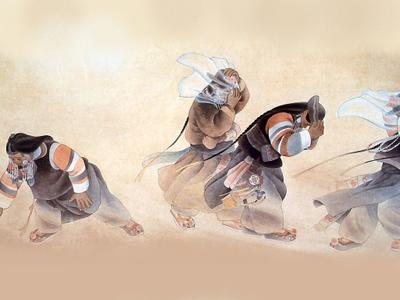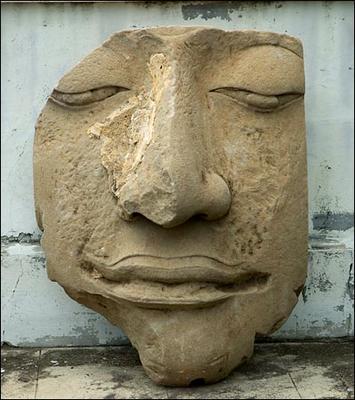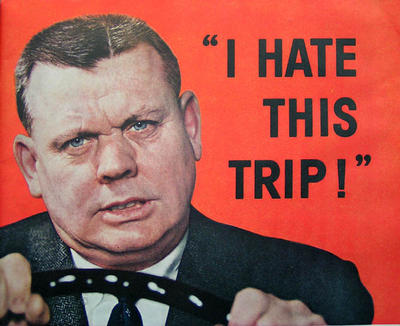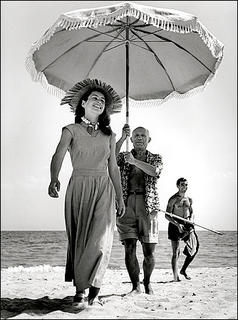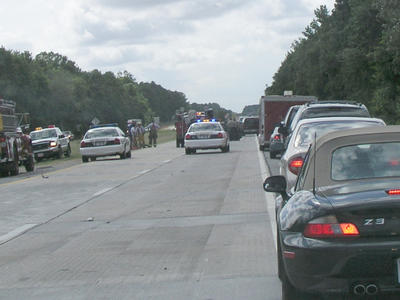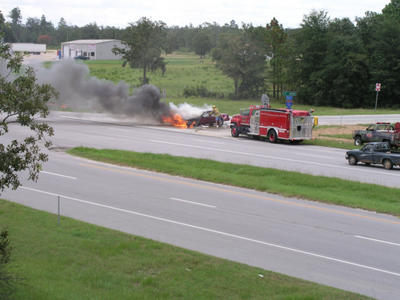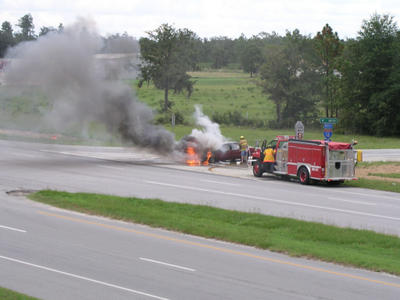 I was wondering if I could run a few questions by you. The more I practice, the more I get confused. When I first started sitting, it was just sitting. I had thoughts (pictures, memories, etc.) that flashed around in my mind, but I could let them go and come back to my breath. The result of my "just sitting" was that I became more focused and relaxed. Now, I am starting to feel as though I am missing something (insight). Does practice bring answers/insight into daily living? How does this work? How will I know I have had an insightful experience?
I was wondering if I could run a few questions by you. The more I practice, the more I get confused. When I first started sitting, it was just sitting. I had thoughts (pictures, memories, etc.) that flashed around in my mind, but I could let them go and come back to my breath. The result of my "just sitting" was that I became more focused and relaxed. Now, I am starting to feel as though I am missing something (insight). Does practice bring answers/insight into daily living? How does this work? How will I know I have had an insightful experience?I believe that practice of zazen does bring insight into daily living. In fact, a non-Zen form of Buddhist meditation (that is, not in the Japanese tradition) refers to itself as "insight meditation," and their techniques are very much like ours: sitting quietly, counting the breath, etc. Anyway, during our "active" lives, that is while not sitting, our mind is constantly translating our experiences to us. We're always talking to ourselves, putting our thoughts into words, putting our experiences into words, and this process actually inhibits and reduces the direct experience of our lives. Just like my computer works more slowly while it's printing, so my mind slows down while I'm trying to break every thought down into language.
As I sit and observe my mind, I've realized that full-blown ideas actually pop into my head virtually instanteously and complete, and that my mind then tries to translate those ideas into words, which only slows the thoughts down. Thoughts are like slippery fish, and the tighter I try to hold them, the more likely they are to slip from my grasp.
The funny thing is I know how the sentences I'm thinking are going to end, and yet I finish those sentences anyway. Why? For whose benefit? I already know the next word I'm going to think. However, during zazen, in deep samadhi, the mind can be freed from this grasping process of always slowing down to articulate what it is thinking about, and can actually get something done for once. When fully-blown ideas or thoughts pop into our heads during our "active" life, that is, when they somehow get around the roadblocks created by articulation, we call these sudden flashes "intuition," or "inspiration," or "insight." But they're always there - it's just that our busy minds don't often allow them the chance to surface. However, during zazen, the barriers are down and we can allow full-blown "insights" to appear.
This will happen to you as you continue your practice, and in fact, I'm willing to bet it has already happened. Somehow, the idea popped into your head to email me and ask these questions. How did these questions appear? Where did they come from? I'm not saying that we acquire magical powers to know all and to be infallible, just that we can finally unharness our consciousness from the yoke of words, and that fresh ideas will just naturally bubble up without inhibition or restraint. And you will know when this has happened by the little light bulb that flashes in your mind, and you realize "Oh, I can do this" or "I should try that."
However the surest way for it not to happen is to anticipate it or try to make it happen. Then our mind is looking at every thought, thinking "Here comes one now," and tries to seize it and pin it down, grasping at that slippery fish, which is exactly the process we're trying to avoid. It can only happen when we're not thinking about it, when we're least expecting it.
I have a hard time understanding emptiness. I don't see how anything can be truly empty. For example, an empty room contains air (molecules, gases, etc. we can't see). Therefore how can it be empty?Emptiness had long been a tricky concept for me, as well. Personally, I think the term is a little misleading, but I cannot think of another word that would do better. We don't necessarily mean "empty" as in "hollow" or "without content," but "empty" as in "empty of any independent existence." Everything, at some level, is a part of everything else if we examine it closely enough, and nothing can be separated completely from everything else. A teacup can be defined as much by its form as it can by all of the space that it's not occupying, just like those black-and-white pictures of a vase that, when looked at differently, can be seen as two profiles facing each other. The form (the white vase) is defined by the emptiness (the black profiles), just as the emptiness is defined by the form.
So it is with our selves. I am the one who is not others. Others are the ones who are not me. If there were no "me," then there would be no "others" (at least from my perspective), just as if there were no "others," there would be no "me." My concept of "me" relies on there being others - the concept has no independent existence. In fact, I cannot say who I am without referencing others - I am either "so-and-so's son," "an employee of such-and-such company," "a friend of X," etc. - or without referencing some other thing or verb - I am "the one sitting on this chair," "the one wearing these clothes," "the one breathing," or even "the one thinking" ("I think, therefore am I?").
So every time you hear the term "empty," just think of it as shorthand for "empty of any independence existence" and that should work . . . most of the time. However, everything really is just empty space as well, and more rarely the term "emptiness" is used in this sense. Look closer at the room you described. Yes, it's full of gas molecules, but what are those molecules made of? Atoms. And what are those atoms made of? Well, mostly empty space, but with tiny, tiny bits of subatomic particles spinning about at incredible speeds. And what are those particles made of? According to science . . . nothing. They're more energy, like light, than matter. So the room, at the deepest level, is made up of mostly empty space with nothing of any real substance or matter. It is profoundly empty after all.
The Buddha, without any knowledge of modern physics, grasped this emptiness intuitively, through direct experience. Nothing is substantial or "real," nothing has independent existence, it is all just thus, and we call this "emptiness." It takes a little while to get your head around it.
I think of merit as good Karma in the sense that when we say "may this merit extend universally to all" we are asking/invoking/hoping for good Karma for all beings. I'm still fuzzy about how the merit comes about in the first place. Where does it begin?I think you are correct in that "merit" and "karma," or at least "good" karma, are the same thing. When we wish this merit to extend universally to all, we're trying to pass on the good karma we've accumulated.
That's the easy part. Now, where does the merit come from? Here comes one of those Zen answers that people hate: you have to decide for yourself. Is there really even such a thing as karma? Sure, if I become angry and act out of anger, I will experience the repercussions of that anger (the person I'm angry at may resent me, my blood pressure may rise, etc.), but is this repercussion stored away in some sort of metaphyiscal warehouse? Is it a transferable commodity that I can wish on to others? Does it follow me after death, or for that matter, does it even last beyond my own existence?
I don't have those answers for you, but you do. Just like "do we have a soul?" or "is there a God?," these were questions that the Buddha refused to answer. I have my own opinions on some of these matters, but they're conditioned by my own unique experiences and perspective, i.e., my karma, just as yours are for you. But the Buddha told his followers not to worry about such things, but to work instead on knowing their own minds, and once that was accomplished, all these things would be self evident. The answers, he taught, are right in front of us. We're just not seeing them right.
 Here's a picture of the hotel that I had been staying at in Pascagoula, near I-10 about ten or so miles inland, from the hotel's web site.
Here's a picture of the hotel that I had been staying at in Pascagoula, near I-10 about ten or so miles inland, from the hotel's web site.
 Here's how the hotel looked last Monday. The picture's from a Mississippi newspaper's site.
Here's how the hotel looked last Monday. The picture's from a Mississippi newspaper's site.
 This Burger King was near the hotel; again about ten or so miles inland.
This Burger King was near the hotel; again about ten or so miles inland.
 And here's a picture of a chemical plant in Pascagoula after the storm.
And here's a picture of a chemical plant in Pascagoula after the storm.
 In Mobile, an oil rig ran up against a bridge over Mobile Bay.
In Mobile, an oil rig ran up against a bridge over Mobile Bay.
 Finally, here's a monkey water skiing (included just so that this blog entry isn't all doom and gloom).
Finally, here's a monkey water skiing (included just so that this blog entry isn't all doom and gloom).
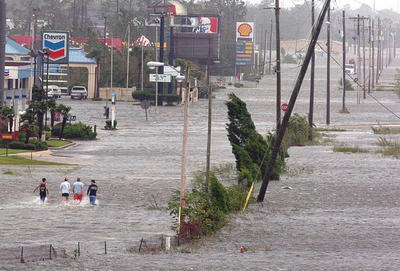
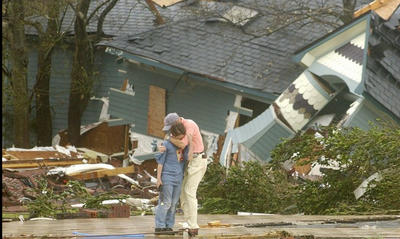

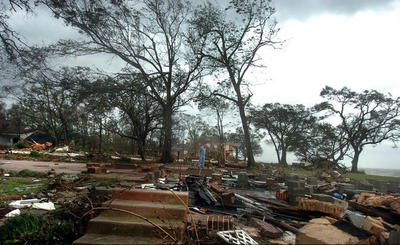

 Update: It's now almost 7 p.m., and the rain of Katrina is coming down hard upon the City of Atlanta. I'm expecting the electricity to go out at any minute, possibly even while I'm typing this entry.
Update: It's now almost 7 p.m., and the rain of Katrina is coming down hard upon the City of Atlanta. I'm expecting the electricity to go out at any minute, possibly even while I'm typing this entry.





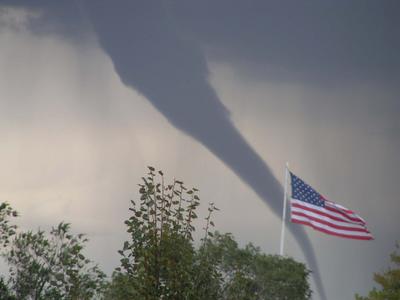



 For what it's worth, I'm back in Pascagoula. Acting according to conditions, I work through my day and return to the hotel. When I find my mind day dreaming or fantasizing or complaining or wandering in any way, I just try to return it to whatever task I'm at, no matter how mundane - driving my rented Corolla, eating at Cracker Barrel, typing my blog, washing. I'm not always successful, but I don't let that daunt me - I just go back to trying to focus my attention again, and smile at myself for my little digressions.
For what it's worth, I'm back in Pascagoula. Acting according to conditions, I work through my day and return to the hotel. When I find my mind day dreaming or fantasizing or complaining or wandering in any way, I just try to return it to whatever task I'm at, no matter how mundane - driving my rented Corolla, eating at Cracker Barrel, typing my blog, washing. I'm not always successful, but I don't let that daunt me - I just go back to trying to focus my attention again, and smile at myself for my little digressions.



